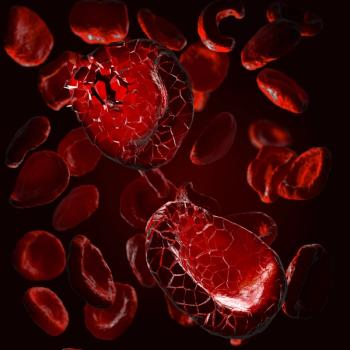
Patients with unresectable or metastatic melanoma can now receive treatment with nivolumab and relatlimab-rmbw following its approval by the FDA.

Your AI-Trained Oncology Knowledge Connection!


Hayley Virgil is a senior editor with CancerNetwork. When she isn't traveling to conferences and championing health equity in the oncology space, she can be found hiking, foraging wild plants, gardening, sewing ballgowns, practicing embroidery, or playing video games.

Patients with unresectable or metastatic melanoma can now receive treatment with nivolumab and relatlimab-rmbw following its approval by the FDA.

Patients with untreated metastatic or unresectable melanoma experienced numerically improved overall survival and response rates as well as long-lasting progression-free survival benefit following treatment with nivolumab and relatlimab.

In recognition of Kidney Cancer Awareness Month, CancerNetwork® spoke with Laurence Albigès, MD, PhD, about immunotherapy combination trials for renal cell carcinoma that read out at the 2022 Genitourinary Cancers Symposium.

Axillary ultrasound and biopsy appear to be an effective strategy to identify nodal disease in patients with early-stage triple-negative breast cancer.

A phase 1 study of davoceticept and pembrolizumab for advanced malignancies received a partial clinical hold from the FDA following a patient death.

Pediatric patients with newly diagnosed pediatric T-cell lymphoblastic lymphoma experienced an improvement in survival following treatment with bortezomib and chemotherapy.

Applications for darolutamide were submitted to the FDA and European Medicines Agency for the treatment of patients with non-metastatic hormone-sensitive prostate cancer.

The phase KEYNOTE-716 trial, which assessed the use of adjuvant pembrolizumab in patients with resected stage IIB and IIC melanoma, met its secondary end point of distant metastasis-free survival.

Post-resection survival could be predicted by FAM46C expression in patients with gastric adenocarcinoma.

A supplemental new drug application for ivosidenib plus azacitidine was granted priority review by the FDA for previously untreated patients with IDH1-mutant acute myeloid leukemia.

NUC-1031 plus cisplatin was unlikely to reach a primary end point of improved overall survival in advanced biliary tract cancer, leading to the discontinuation of the phase 3 NuTide:121 trial.

A clinical hold has been placed on the phase 1b CYAD-101-002 trial, examining pembrolizumab after treatment with CYAD-101 and folinic acid, fluorouracil, and oxaliplatin preconditioning in metastatic colorectal cancer.

Following a submission of updated survival data, the FDA has extended the Prescription Drug User Fee Act date for ublituximab/umbralisib in chronic lymphocytic leukemia and small lymphocytic lymphoma.

Topline findings from the phase 3 SIENDO trial did not appear to likely support a supplemental new drug application use of selinexor in patients with advanced or recurrent TP53 wild-type endometrial cancer, prompting the creation of a new phase 3 trial to support a future submission.

New findings indicate that mechanisms of genomic escape seen in covalent and some noncovalent Burton tyrosine kinase inhibitors could be responsible for drug resistance in relapsed/refractory chronic lymphocytic leukemia.

The inaccuracy of standard immunohistochemistry testing to identify ERBB2-low breast cancer could lead to real-world mismanagement of patients who may be eligible for fam-trastuzumab deruxtecan-nxki.

Patients with early stage glottic larynx carcinoma benefitted from treatment with tumor-focused stereotactic radiotherapy.

In recognition of Black History Month, key opinion leaders from the community oncology space and beyond speak to how organizations are working to diversify clinical cancer research and combat outcome disparities.

Patients with advanced endometrial cancer derived a more notable survival benefit after being treated with lenvatinib and pembrolizumab compared with chemotherapy alone.

Patients with HER2-low metastatic breast cancer achieved clinically meaningful improvement in progression-free survival following treatment with fam-trastuzumab deruxtecan-nxki.

Patients with checkpoint inhibitor–naïve metastatic urothelial cancer appeared to experience promising anti-tumor activity following treatment with second line sacituzumab govitecan and pembrolizumab.

The European Commission has approved tepotinib for use in patients with advanced non–small cell lung cancer with MET exon 14 skipping alterations.

A new drug application for adagrasib was accepted by the FDA for the treatment of patients with KRAS G12C–mutated non–small cell lung cancer.

Patients with stage II/III HER2-negative breast cancer who were treated with daily high-dose aspirin did not experience an improvement in invasive disease-free survival.

Patients with KRAS G12C–mutated locally advanced or metastatic pancreatic cancer experienced clinically meaningful benefit from treatment with sotorasib .

Patients with recurrent cervical cancer appeared to achieve a promising survival benefit following treatment with cemiplimab.

Findings from a study indicated that patients with melanoma who had a high fiber diet experienced better responses to immunotherapy.

A report from the American Association for Cancer Research described how the COVID-19 pandemic has impacted cancer care and research, and how the space has since adapted.

The FDA's Oncologic Drugs Advisory Committee stated that additional clinical research demonstrating applicability within the United States is necessary to support the biologics license application for a sintilimab combination regimen for non–small cell lung cancer.

Findings from an analysis assessing diverse participation in multiple myeloma FDA drug approval trials highlighted a significant deficit of Black and Hispanic patients.